Now that I’ve got your attention (and may the Holy Fathers of the First and Second Ecumenical Councils forgive me) I’m not suggesting for a moment that the Creed be altered. However, I do I wish the it contained some reference to:
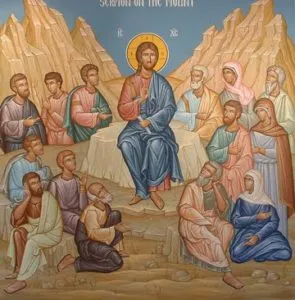
The Teachings of Jesus
By which I mean His directions for living, His teachings about how we should conduct our lives.
I remember a professor in Methodist seminary pointing out to us that in the Creed, nothing, absolutely nothing comes between “and was made Man…” and “…was crucified for us“. He meant this as a corrective to “liberal” Christians of the time who tended to de-emphasize or even ignore Christ’s saving Incarnation, Crucifixion and Resurrection.
There was a reason the Creed is as it is, of course. It was written for “defensive” purposes – to defend and clarify the Faith, in opposition to those who misunderstood or even denied the Incarnation and the Resurrection. No one was denying the Lord’s teachings, so that wasn’t included in the Creed. However, the unfortunate result has been that it has sometimes been tempting for Orthodox (and even orthodox) Christians to de-emphasize it. However, between the Lord’s Birth and His Crucifixion came three years when “Jesus went about all Galilee, teaching in their synagogues, preaching the gospel of the kingdom”. Matthew 4:23
Do we ever hear Christ’s teachings at Sunday Liturgy? A little, during summer and autumn when our readings take us through the Gospel accounts of Matthew and Luke. However, most appear during the week, and how many Orthodox follow our weekday lectionary? Not many, I fear.
Which is tragic. These days, especially from the media, people ae exposed so many sorts of advice, both good and bad and in-between, about how to live. However, He “through Whom all things were created” is the only One Who knows what true living is all about. When Jesus said “Follow me”, He meant not simply that we should follow Him into death and see what happens. He meant we should follow His commands which give us the Path which through life can lead us into a holy death and Resurrection with Him.
Therefore, in these next few Posts let’s look at what our Divine Rabbi taught us about how to live our lives.
Speaking only for myself (who else can I speak for?), trying to follow His commands (not that I’ve done it well) has both saved me from a lot of trouble and also got me into some trouble. Perhaps I’ll describe some of this as we proceed. Or perhaps not. Also, since in the previous Post we looked at how to approach politics as Orthodox Christians, who knows? perhaps this also will set the standards by which we should expect Christian politicians to conduct themselves.
In chapters 5, 6 and 7 of his Gospel account, Saint Matthew sums up the essential teachings of the Master. So let’s begin there and see how much we can cover today.
Matthew, Chapter Five
“And seeing the multitudes, He went up on a mountain, and when He was seated His disciples (generally taken to mean “followers”, not just the Twelve) came to Him. Then He opened His mouth and taught them…” Matthew 5:1-2 He must have had a powerful, resonant voice.
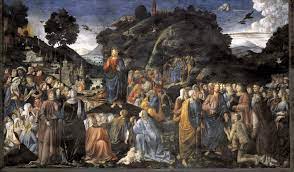
Thus begins His famous “Sermon on the Mount”. *
- Those of you who read the Scriptures regularly – and if it’s a choice between reading this Blog and reading the Bible, read the Bible! – will know that Luke’s Gospel, chapter 6, contains a similar “Sermon on the Plain”also directed to His “disciples”, but with somewhat different directions. (For example, in the Beatitudes Matthew says “Blessed are the poor in spirit”, while Luke says only “Blessed are the poor”. Why the difference? Probably He was speaking to a different crowd. All good preachers direct their words to their hearers.
Matthew’s account of Christ’s teachings begins with:
The Beatitudes: Matthew 5:3-10
Let’s look at them, one by one. I don’t intend this to be a scholarly exposition – whole books have been written about each of them. We will need to dig into the language occasionally, but I mean this to be chiefly a quick, somewhat stream-of consciousness, summary of what little I’ve learned about the Beatitudes over the years, both from my own experience, and through observing what has happened around me. As you’ll note, I understand some of them better than others.
We do need to make a scholarly point first: Did you know that the word μακάριοι (makarioi), usually translated into English as “blessed”, equally means “happy”. In Orthodox services, when a priest says “May the blessing of God Almighty, the Father, Son and Holy Spirit….” or when any of us say to someone “God bless you” – we might just as easily say “God make you happy.” But what kind of happiness? Is it the kind of pleasure I might get from my morning cappuccino * (as i’m having right now) or a piece of chocolate? No, Makarioi mean a deep happiness, abiding, unshakable joy rooted in the assurance of God’s blessing.
- Do I waste $3 on it? No, I’ve found a way to make a good cup at home for about 25 cents. Don’t tell Starbucks or they’ll come after me.
So these Beatitudes are the key to true happiness. In what follows I’ll often use the word “happy” to emphasize how truly startling the Beatitudes sometimes are.
3 Blessed are the poor in spirit,
For theirs is the kingdom of heaven.”
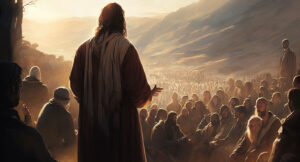 Happy are those who are dissatisfied with themselves, who know they have a long way to go before they have true happiness, which we find only in the Kingdom of Heaven. “It is not the healthy who need a doctor, but the sick. I have not come to call the righteous, but sinners .” Mark 2:16-17 And where is the Kingdom of Heaven to be found? Not only in the “hereafter”. Christ began His ministry with these words: “From that time on Jesus began to preach, ‘Repent, for the kingdom of heaven has come near'” Matthew 4:17 – for wherever the King of Heaven is, there is His Kingdom.
Happy are those who are dissatisfied with themselves, who know they have a long way to go before they have true happiness, which we find only in the Kingdom of Heaven. “It is not the healthy who need a doctor, but the sick. I have not come to call the righteous, but sinners .” Mark 2:16-17 And where is the Kingdom of Heaven to be found? Not only in the “hereafter”. Christ began His ministry with these words: “From that time on Jesus began to preach, ‘Repent, for the kingdom of heaven has come near'” Matthew 4:17 – for wherever the King of Heaven is, there is His Kingdom.
4 Blessed are those who mourn,
For they shall be comforted.
Happy are those who are sad! saddened by their own spiritual condition, and by the sufferings of those around them, indeed of the whole world. Happy are those who truly love, who care. Does it make us happy when we fall into sin? Only briefly. Sometimes. Does it makes us happy when we recover our senses, repent and turn to God? Yes.
5 Blessed are the meek,
For they shall inherit the earth.
I think “meek” is a terrible translation. It suggests to me “submissive”, “yielding”, “passive”. “Hit me again…!” No, that’s not the point at all. The Greek word πραΰς (praus) means “humble, gentle or mild-tempered”.The following is not theory; it is an observation: Who has had lasting power on earth? Caesar? Pontius Pilate? Hitler? Stalin? Who has the most followers today? the Man who died humbly on a Cross. Love is the most powerful force on earth. Or to reduce it to very superficial terms: I hope it’s not crass to add: “Honey attracts more flies than vinegar”. *
- I can’t resist adding: Will someone please tell this to Vladimir Putin and Patriarch Kirill?
6 Blessed are those who hunger and thirst for righteousness,
For they shall be filled.
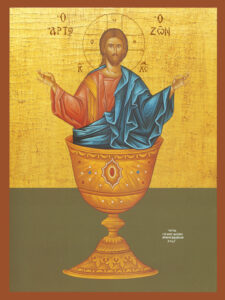
At Jacob’s Well, while Christ was speaking with the Woman of Samaria, His disciples went into town to get some lunch. But when they returned, to their surprise He wasn’t hungry. They “urged Him, ‘Rabbi, eat something.’ But he said to them, ‘I have food to eat that you know nothing about.'” The disciples, having no idea what He was talking about, asked each other “’Could someone have brought him food?” “My food,” said Jesus, “is to do the will of Him who sent me and to finish His work.” John 4:31-34 “I am the living bread that came down from heaven. Whoever eats this bread will live forever. This bread is my flesh, which I will give for the life of the world.” John 6:51-52
7 Blessed are the merciful,
For they shall obtain mercy.
We need to do a little translating again. The English word “mercy” has negative connotations, can suggest “pity”: “Mercy, Master, don’t beat me”. As we sing over and over “Lord, have mercy”, I wonder how many people misunderstand this. The New Testament Greek for mercy is “eleos” / Ἔλεος , the ancient word for “olive oil”, which provided balm, healing, symbolically fullness of life. This is why we still use it for Holy Unction. Those who provide healing, comfort for others will in the process find it for themselves, the reward of God. I hope we all know this by our experience.
8 Blessed are the pure in heart,
For they shall see God.
This one is easy. Those consumed by passions, whether anger or lust or greed or whatever, will “see” those things; they will crowd the simple vision of God from their eyes. Clean the junk out of our lives and we will see God everywhere around us. Indeed in His Presence our passions can be transformed, redeemed and, put to their original, God-given and proper use. Believe it or not, they can lead us to God.
9 Blessed are the peacemakers,
For they shall be called sons of God.
A little more translating: I think it’s fair to suspect that even the New Testament Greek wasn’t adequate for what Christ said. Jesus spoke usually in the popular tongue, Aramaic, in which the word for “peace” is “shalama” (the same as the Hebrew word “shalom”) which meant not only “tranquility” but also “harmony, wholeness, completeness, prosperity, welfare”. The New Testament Greek translates this word as “Εἰρήνη” / “eirene” which also connotes chiefly “tranquil”, “irenic”. Likewise our English word “peace” suggests only “lack of conflict”.

However, when on Pascha night Christ said “Peace be with you” to His apostles, He knew the apostles wouldn’t have much tranquility in their lives. He meant “fullness of life”, wholeness, completeness. Likewise when at Divine Liturgy the priest says “Peace be to all”, he is not wishing us a quiet life, but rather “the peace of God which passes all understanding” Philippians 4:7 “Peace I leave with you, my peace I give to you: not as the world gives, do I give you.” Following Me, He is saying, may get you into a lot of trouble. But “let not your heart be troubled, neither let it be afraid”. John 14:26–27
So Christ’s “peacemakers” do not necessarily bring tranquility to those around them. They bring wholeness, completeness to the world. “They shall be called sons of God”, like the Son of God who found little tranquility in His life. “Do not think that I have come to bring peace to the earth; I have not come to bring peace, but a sword.” Matthew 10:34
10 Blessed are those who are persecuted for righteousness’ sake,
For theirs is the kingdom of heaven. 11 Blessed are you when they revile and persecute you, and say all kinds of evil against you falsely for My sake. 12 Rejoice and be exceedingly glad, for great is your reward in heaven, for so they persecuted the prophets who were before you.
Happy are those who are persecuted? Happy are you when they revile you and say evil things about you falsely for My sake” Really?
Now, Jesus was not calling us to the demented joy of a “persecution complex”, enjoying suffering for its own sake. (I have never understood that. I hope you haven’t either, but I suspect we have all known people like this.)
No, what He says is: Happy are you [when you are persecuted ” for My Name’s sake”, when we are set upon because we follow Him. The martyrs of the early Church or under the Communists, or in a much lesser way those in our increasingly secular society who remain faithful even when people think we are stupid, ignorant because we follow out Jesus and His Church’s teachings, who despite that, despite our own failings, end our lives still with the Lord.
Christ clearly is not talking about superficial happiness here. This is the kind 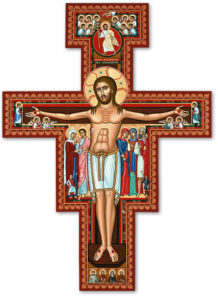 of happiness Jesus Himself knew hanging on the Cross. I wrote in a long-previous Post about the proper Orthodox crucifix, which shows Our Lord hanging there not helpless in agony, but His Body almost standing in triumph, in some icons looking almost pleased with Himself, as well He might: “It is finished! I have done it! I did what I came to do. I have completed My life faithful to my Father to the end.”
of happiness Jesus Himself knew hanging on the Cross. I wrote in a long-previous Post about the proper Orthodox crucifix, which shows Our Lord hanging there not helpless in agony, but His Body almost standing in triumph, in some icons looking almost pleased with Himself, as well He might: “It is finished! I have done it! I did what I came to do. I have completed My life faithful to my Father to the end.”
It goes without saying that none of us will live a sinless life like Him. But we can live a repentant life, always returning to Christ when we have failed, in that sense faithful to the end of our lives. Blessed are you if you never give up! Never give up! Never give up! “Your reward is great in Heaven”
Finally, returning to last week’s Post: If we can’t necessarily apply all this directly to politics, surely it should be applicable to Christian politicians.
_________________________________________
I really wanted to cover chapter 5 today. So where are we? We’re about 1/4 of the way through it! However, this seems a convenient place to stop for now. I’ll try to move faster next week. Promise.
Next Week: We’ll conclude (I hope) Matthew 5. Be prepared: Now Christ’s commands get tougher..
Thank you Fr Bill. As a baptized Methodist who went through Quaker meetings in my teens, converted to Orthodoxy in my 40s I feel an affinity to you. You speak for how I feel and thank you, again for the enrichment of your experience
You’re welcome. God bless you, Gregory.